- Home
- S. J. Parris
Giordano Bruno 01 - Heresy Page 4
Giordano Bruno 01 - Heresy Read online
Page 4
He paused as if contemplating some idea, then his thoughts appeared to land briskly elsewhere. “When you told me you wished to serve Her Majesty in any way she saw fit to use you—was this offer sincere?”
“I would not make such an offer in jest, Your Honour.”
“Her Majesty has money in her treasury for those willing to be employed under my authority, to aid in protecting her person and her realm from her enemies. And she would show her gratitude by other means as well—I know how important patronage and preferment can be to you writers. This would be the greatest service you could perform for her, Bruno. Living at the French embassy, you will be privy to a great many clandestine conversations, and anything you hear touching plots against Her Majesty or her government, anything that concerns the Scottish queen and her French conspirators”—he spread his arms wide—“letters you may glimpse, anything that you think may be of interest, no matter how small, would be of great value to us.”
He looked at me then, eyebrows raised in a question.
I hesitated. “I am flattered that Your Honour shows such faith in me—”
“You have scruples, of course,” he cut in, impatiently. “And I would think the less of any man who did not. I am asking you to present a false face to your hosts, and an honest man should pause before taking on such a role. But remember, Bruno, whenever you feel the wrench between conscience and duty, your care should always be for the greater good. The innocent among them will have nothing to fear.”
“It is not quite that, Your Honour.”
“Then what?” He looked puzzled. “Philip Sidney told me you were so much an enemy of Rome that you would gladly join the fight against those who would bring the Inquisition to these shores.”
“I am an enemy of Rome, Your Honour, as I am opposed to all who would tell men what to believe and then execute them when they dare to question the smallest part of it.”
I was silent for a moment while he regarded me through narrowed eyes.
“We do not punish men for their beliefs here, Bruno. Her Majesty once eloquently declared that she had no desire to make windows into men’s souls, and nor do I. In this country, it is not what a man believes that will lead him to the scaffold but what he may do in the name of those beliefs.”
“What he may do, or what he can be proved to have done?” I asked pointedly.
“Intent is treason, Bruno,” he replied, impatiently. “Propaganda is treason. In these times, even distributing forbidden books is treason, because anyone who does so, does it with the intent of converting those into whose hands they place them. And converting the queen’s subjects means seducing their loyalties away from her to the pope, so that if a Catholic force invaded, they would side with the aggressors.”
We sat in silence for a moment, then he placed a hand on my arm. “Here in England, a man of progressive ideas such as yours, Bruno, may live and write freely, without fear of punishment. That, I presume, is why you came here. Would you have the Inquisition return to threaten those freedoms?”
“No, Your Honour, I would not.”
“Then you will consent to serve Her Majesty in this way?”
I paused, and wondered how my answer would change my fortunes.
“I will serve her to the best of my ability,” I replied.
Walsingham smiled broadly then—I caught the glint of his teeth in the dusk—and clasped my hand between both of his, the skin dry and papery.
“I am exceedingly glad, Bruno. Her Majesty will reward your loyalty, when it has been proved.” His eyes shone. Around us the garden was almost in darkness, though a few streaks of gold light still edged the violet banks of cloud behind the trees and the air had grown chill, the plants releasing sweet scents into the evening breeze. “Come, let us go inside. What a poor host I am—you have not even had a drink.”
He rose, with an evident stiffness in his back and hips, and began making his way over the grass.
A servant had lit a series of small lanterns along each side of the path through the knot garden, so that as we approached the house our way was illuminated by two rows of flickering candles; the effect was charming, and as I took a deep breath of the evening air, I felt again an intimation of new possibilities, a future that I could grasp. The long days of travelling through the mountains of northern Italy, staying in filthy roadside inns infested with rats, where I would force myself to keep awake all night with one hand on my dagger for fear of being murdered for the few coins I carried, seemed very far distant; I was entering the intelligence service of the queen of England. Another of my life’s unexpected turns, but part of the great map of my strange journey through the world, I thought.
Walsingham halted just before the lanterns and leaned toward me.
“I will arrange for you to meet with my assistant, Thomas Phelippes,” he said. “He organises the logistics—devises ciphers, delivery points for correspondence, that side of business. He is the most skilled man in England for breaking codes. I hardly need to say that you should not breathe a word of our meeting to anyone except Sidney,” he added, in a low voice.
“Your Honour, I was once a priest—I can lie as well as any man.”
He smiled.
“I rely upon it. You could not have outwitted the Inquisition for this long without some talent for dissembling.”
So it was that I became part of what I later learned was a vast and complex network of informers that stretched from the colonies of the New World in the west to the land of the Turks in the east, all of us coming home to Walsingham, holding out our little offerings of secret knowledge, as the dove had returned to Noah bearing her olive branch.
A SUDDEN CRACK of thunder jolted me out of memory, back to the room where I sat pressed up against the rain-slick window of a royal palace, watching a courtyard illuminated by sheets of light. In England I had hoped to live peacefully and write the books that I believed would shake Europe to its foundations, but I was ambitious and that was my curse. To be ambitious when you have neither means nor status leaves you dependent on the patronage of greater men—or, in this case, women. Tomorrow I would see the great university city of Oxford, where I must ferret out two nuggets of gold: the secrets Walsingham wanted from the Oxford Catholics, and the book I now believed to be buried in one of its libraries.
Chapter 2
We left for Oxford at first light the following morning on horses that Sidney had managed to procure from the steward at Windsor, fine mounts with elaborate harnesses of crimson-and-gold velvet, studded with brass fittings that jingled merrily as we rode, but we were undoubtedly a more solemn party than had set out the day before on the river amid music and gaily coloured pennants. The storm had broken but the rain had set in determinedly, the warmth had evaporated from the air, and the sky seemed to sag over us, grey and sullen; it would have been impossible to travel by river without being half drowned. The palatine was much quieter over breakfast and sat with his fingers pressed to his temples, occasionally emitting a little moan—Sidney whispered to me that this was the penance for a late night and prodigious quantities of port wine—and my mood was much improved accordingly. Sidney was cheerful, as his winnings from the night’s card games had grown steadily in direct proportion to the palatine’s drinking, but the weather had dampened our bright mood and we spent the first part of the journey in silence, broken now and again by Sidney’s observations of the road conditions or the palatine’s unapologetic belches.
To either side, the thick green landscape passed unchanging, bedraggled under the rain, the only sound the muted thud of hooves on the wet turf as Sidney drew his horse alongside mine at the head of the party and allowed the palatine to fall behind, his head drooping to his chest, flanked by the two body servants who attended him, their horses carrying the vast panniers containing Laski’s and Sidney’s finery for the visit. I had only one leather bag with a few books and a couple of changes of clothes, which I kept with me, strapped to my own saddle. By the middle of the afternoon we had
reached the royal forest of Shotover on the outskirts of Oxford. The road was poorly maintained where it passed through the forest, and we had to slow our pace so the horses would not stumble in the puddles and potholes.
“So, Bruno,” Sidney said, keeping his voice low, when we were out of earshot of the palatine and his servants, “tell me more about this book of yours, that has brought you all the way from Paris.”
“For the last century it was thought lost,” I replied softly, “but I never believed that, and all through Europe I met book dealers and collectors who whispered rumours and half-remembered stories about its possible whereabouts. But it was not until I was living in Paris that I uncovered real proof that the book could be found.”
In Paris, I told him, among the circle of Italian expatriates that gathered around the fringes of King Henri’s court, I had met an aged Florentine gentleman named Pietro, who never tired of boasting to acquaintances that he was the great-great-nephew of the famous book dealer and biographer Vespasiano da Bisticci, maker of books for Cosimo de’ Medici and cataloguer of the Vatican library. This Pietro, knowing of my interest in rare and esoteric works, recounted to me a story passed down to him by his grandfather, Vespasiano’s nephew, who had been an apprentice to his uncle in the manuscript trade during the 1460s, in the last years of Cosimo’s life. Vespasiano had assisted Cosimo in the collection of his magnificent library, making more than two hundred books at his commission and furnishing the copyists with classical texts, so that the book dealer became an intimate associate of the Medici circle, and in particular a friend of Marsilio Ficino, the great humanist philosopher and astrologer whom Cosimo had appointed head of his Florentine academy and official translator of Plato for the Medici library. As Pietro’s grandfather, who was then the young apprentice, told it, one morning in 1463, the year before Cosimo died, Ficino came to visit Vespasiano at his shop, clearly in a state of some distress, clutching a package. Ficino had already begun work on the Plato manuscripts when he had received word from his patron that he must abandon them and turn his attention as a matter of urgency to the Hermetic writings, which had been brought out of Macedonia some three years earlier by one of the monks Cosimo employed to adventure overseas in search of books from the libraries of Byzantium, but which had yet to be examined. Perhaps Cosimo knew he was dying and wanted to read Hermes more than he wanted to read Plato in the last days of his life, I can only speculate. In any case, the story goes that Ficino told Vespasiano, ashen-faced and trembling, that he had read the fifteen books of the Hermetic manuscript and knew that he could not fulfil his commission. He would translate for Cosimo the first fourteen, but the final manuscript, he said, was too extraordinary, too momentous in its import, to put into the language of men hungry for power, for it revealed the greatest secret of Hermes Trismegistus, the lost wisdom of the Egyptians, a secret that could destroy the authority of the Christian church. This book would teach men nothing less than the secret of knowing the Divine Mind. It would teach men how to become like God.
Ficino had brought this devastating Greek manuscript to the shop with him, carefully wrapped in oilskins; here he handed it over to Vespasiano, exhorting him to keep it safe until such time as they could decide what should be done with it while Ficino would tell Cosimo that the fifteenth book had never been brought out of Byzantium with the original manuscripts. This was the plan, and the remaining books were duly translated; after Cosimo died the following year, Ficino and Vespasiano met to discuss the fate of the fifteenth book. Vespasiano saw the opportunity for profit and favoured selling it to one of the wealthy monastic libraries, where experienced scholars would know how to keep it safe from the eyes of those who might misinterpret or abuse the knowledge it contained; Ficino, on the other hand, had begun to regret his earlier delicacy and wondered whether it might not be better to translate the book after all, bringing its secrets into the light by revealing them first to the eminent thinkers of the Florentine Academy, the better to debate the impact of what was effectively the most blasphemous heretical philosophy ever to be uttered in Italy.
“So who won?” Sidney asked, forgetting to keep his voice down, his eyes gleaming through the stream of rainwater dripping from the peak of his cap.
“Neither,” I replied bluntly. “When they came to take the manuscript from the archive, they made a terrible discovery. The book had been sold by mistake some months earlier with a bundle of other Greek manuscripts that had been ordered by an English collector.”
“Who?” Sidney demanded.
“I don’t know. Nor did Vespasiano.” I lowered my eyes and we rode on in contemplative silence.
Here Pietro’s story ended. His grandfather, he said, knew no other details, only that an English collector passing through Florence had taken the manuscript and that Vespasiano was never able to trace it, though he tried through all his contacts in Europe until the end of his long life, at the end of the last century. It was little enough to go on, I knew; there had been numerous English collectors of antiquities and rare books travelling through Italy in the past century, and there was no knowing whether the man who had acquired such a book by accident might have sold it or merely abandoned it to gather dust in some corner of a library, not realising what fortune had dropped into his hands.
“Then why do you believe it is in Oxford?” Sidney asked, after a while.
“Process of elimination. The English collectors travelling through Europe in the last century would have been educated men, probably wealthy, and I understand it is the custom of English gentlemen to leave books as a bequest to their universities, since precious few can afford to maintain private collections like your Doctor Dee. If the Hermes book ended up in England, it may well have found its way to Oxford or Cambridge. All I can do is look.”
“And if you find it—?” Sidney began, but he was interrupted as his horse suddenly shied sideways with a sharp whinny; two figures had appeared without warning in the middle of the road. We pulled our horses up briskly, the palatine and his servants almost running into the back of us as we looked down at two ragged children, a girl about ten years old and a smaller boy, barefoot in the mud. The girl’s right cheek was livid with a purple bruise. She held out her small hand, palm up, and addressed herself to Sidney in an imploring voice, though her stare was one of pure insolence.
“Alms, sir, for two poor orphans?”
Sidney shook his head silently, as if in sorrow at the state of the world, but reached at the same time for the purse at his belt and was drawing out a coin for the child when there came a sharp cry from behind us. I wheeled around just in time to see one of the palatine’s servants dragged from his horse by a burly man who had emerged silently, along with two others, from among the shadows of the trees to either side. The palatine gave a little shriek, but gathered his wits remarkably quickly and spurred his horse into a gallop, crashing between Sidney and me and almost trampling the two children, who dived into the undergrowth just in time to watch him disappearing around the bend. I jumped from my horse, pulling Paolo’s knife from my belt as I launched myself at the back of one of the assailants, who was swinging a stout wooden staff at the second servant to knock him out of his saddle. Sidney took a moment to react, then dismounted and drew his sword, making for the men who were now trying to cut the straps holding the packs to the horses.
The man I had attacked now roared and lashed at me as I clung to his arm, diverting his blow, so that the servant was able to urge the horse forward, out of harm’s way; another of them ran at me with a crude knife, just catching me on the leg as I tried to kick him away. Incensed, I dropped to the ground and struck out toward him with my own knife, but distracted by a movement from the corner of my eye, I whipped around just in time to see the larger man lifting his stick to aim it at me. I thrust the knife into the fleshy underside of his upper arm and he let out a howl of pain, his arm crumpling to his side as he clutched at the wound with his other hand. I took advantage of his lapse to drive my knife home again, thi
s time into the hand that held the stick, which fell to the ground with a dull thud as I turned to face his friend, still holding his rusted knife toward me, though with less conviction now. Shouting curses in Italian, I lunged at him but feinted, so that, wrong-footed, he slipped in a rut and fell to the ground, still flailing at me with the knife. I kicked him hard in the stomach, then stood astride him as he lay, doubled over and groaning, my knife against his cheek.
“Drop your knife and get the hell back to where you came from,” I hissed, “before I change my mind.” Without a word, he stumbled to his feet, slipping again in his haste, and scurried away into the trees as a chilling scream rent the air; I looked up to see one of the men Sidney was fighting fall slowly to his knees as the poet withdrew his blade from deep in the man’s side. The remaining assailant looked for a moment with horror at his friend’s body slumped in the mud and scrambled for the undergrowth as fast as he could. Sidney wiped his sword on the wet grass by the side of the road and sheathed it, his breath ragged.

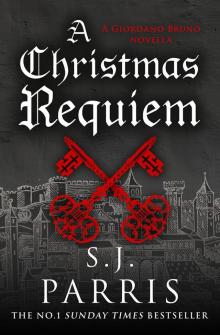 A Christmas Requiem
A Christmas Requiem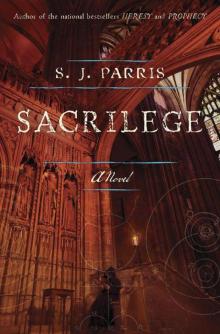 Giordano Bruno 03 - Sacrilege
Giordano Bruno 03 - Sacrilege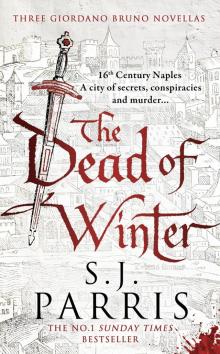 The Dead of Winter: Three gripping Tudor historical crime thriller novellas from a No. 1 Sunday Times bestselling fiction author
The Dead of Winter: Three gripping Tudor historical crime thriller novellas from a No. 1 Sunday Times bestselling fiction author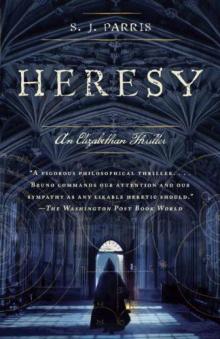 Giordano Bruno 01 - Heresy
Giordano Bruno 01 - Heresy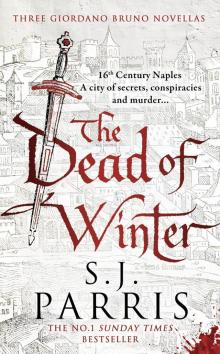 The Dead of Winter
The Dead of Winter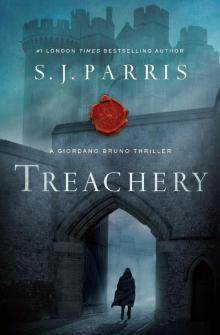 Treachery (2019 Edition)
Treachery (2019 Edition)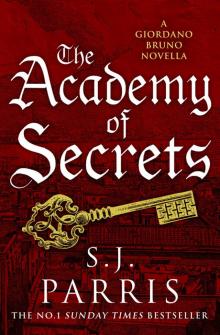 The Academy of Secrets
The Academy of Secrets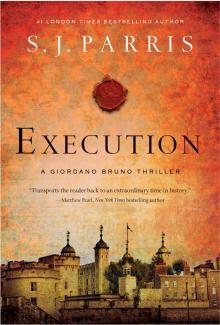 Execution
Execution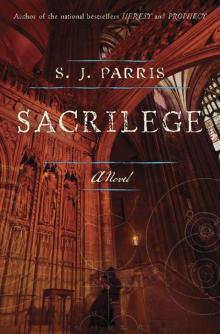 Sacrilege: A Novel
Sacrilege: A Novel Prophecy
Prophecy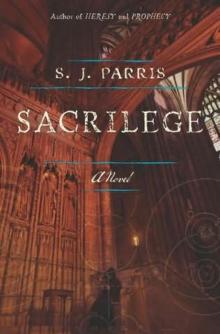 Sacrilege gb-3
Sacrilege gb-3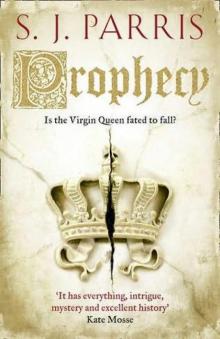 Prophecy (2011)
Prophecy (2011) Treachery
Treachery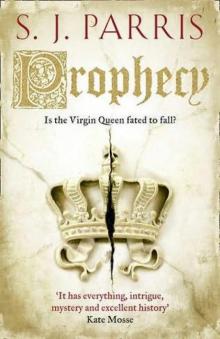 Prophecy gb-2
Prophecy gb-2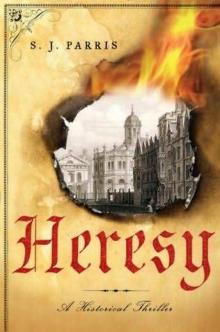 Heresy
Heresy